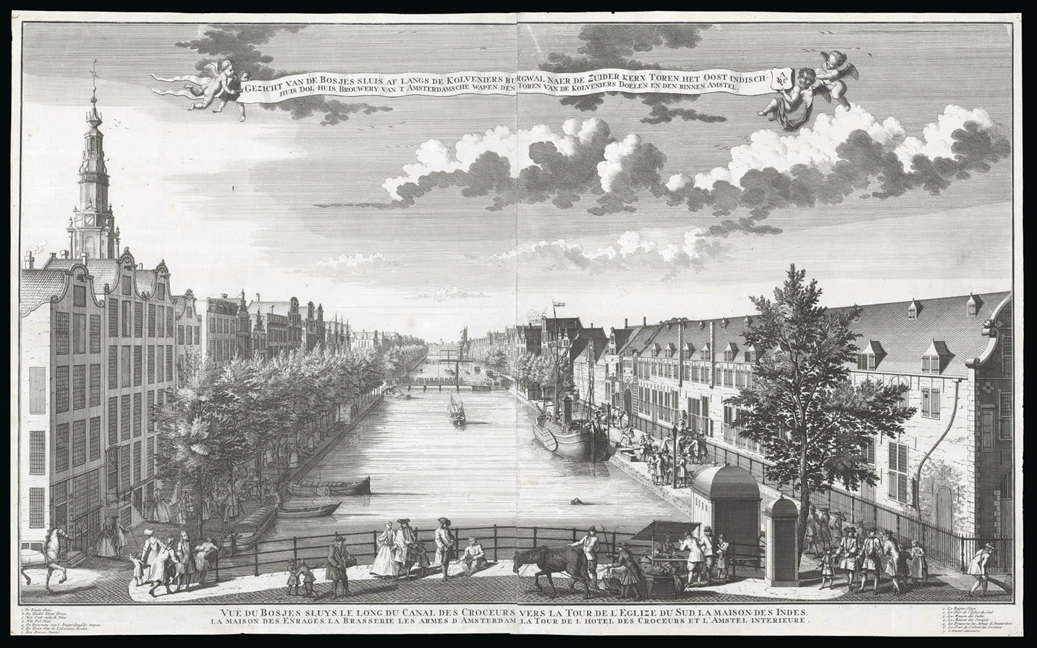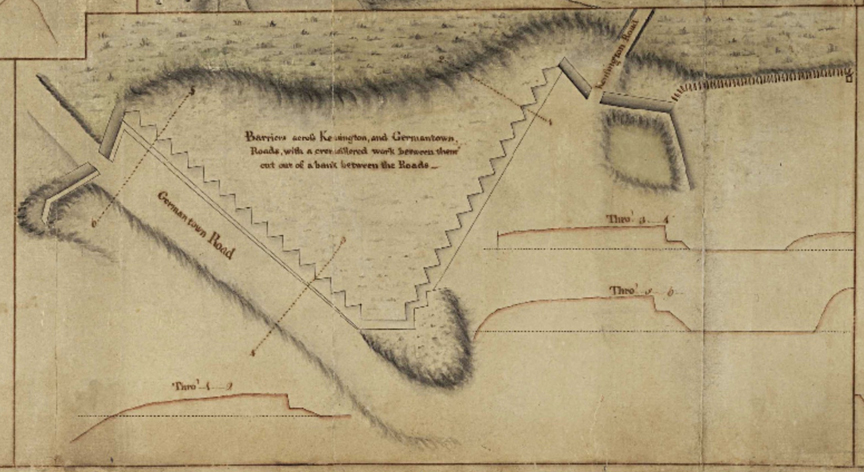Put a large army in a rural community overseas, and some problems are bound to occur. Such was the case when thousands of British and German soldiers descended on Staten Island at the beginning of July 1776. The army was composed largely of professional career soldiers, but there was always a fringe that defied discipline. Although almost the entire army obeyed the strict rules of conduct spelled out in the Articles of War and in general orders, a few soldiers committed crimes against the army and the local population. Desertion, theft, and even a murder occurred within the first month of the army’s landing.
Francis, Lord Rawdon, an officer in the 63rd Regiment of Foot, wrote a letter to his uncle relating another crime:
The fair nymphs of this isle are in wonderful tribulation, as the fresh meat that our men have got here has made them as riotous as satyrs. A girl cannot step into the bushes to pluck a rose without running the most imminent risk being ravished, and they are so little accustomed to these vigorous methods that they don’t bear them with the proper resignation, and of consequence we have most entertaining courts-martial every day.[1]
This letter was published in 1934, and this passage has been used repeatedly ever since as evidence of British military depredations against the local population on Staten Island. But there’s a problem: Rawdon’s colorful claim isn’t supported by any other evidence.
Rawdon writes of courts martial. There are records of these military trials. Rape was a capital crime in the military as well as in the civil justice system; as such, it was tried at a high level called a general court martial (as opposed to a regimental court martial). The records of most such trials survive. Of 587 general court martial trials held in America between August 1774 and August 1783, only eight were for rape cases; six defendants were soldiers and two were mariners.[2] None of those trials occurred on Staten Island during the month between the British landing and Rawdon’s writing.
A few general courts sat in America for which the proceedings have not survived. But we know about these cases because they’re summarized in orderly books.[3] Orderly books covering the summer months on Staten Island in 1776 contain no mentions of rape trials, while they do mention numerous trials for other crimes.[4]
Could it be that some of these crimes were tried at the regimental level? That would be legal as long as the death penalty wasn’t among the potential penalties; the crimes could be regarded as assaults rather than rapes, depending on the details. Records of regimental courts are very rare, and none are known to exist pertaining to regiments on Staten Island in 1776. Examining those that do exist, however, shows that sexual assaults of any kind were very rarely tried by regimental courts. Out of some 1400 trials in six regiments and detachments, only one trial was for rape.[5] One trial for assault is known in a regiment for which comprehensive records are not available.[6] Perhaps things were different on Staten Island that summer, but evidence does not support such an assumption.
Rawdon’s letters home include many colorful, sarcastic and humorous passages. He was clearly trying to entertain as well as inform. Could it be that his stories of deflowering on Staten Island were crafted to amuse regardless of veracity? Even information from sources that are obviously biased do not support Rawdon’s claim: a deserter from the 55th Regiment, someone we’d expect to tell his American hosts the most despicable things possible about his former British comrades, deposed instead that “the inhabitants of Staten Island are well and no Soldier dare do any thing agt them.”[7] The soldier had deserted only days after the British landed and weeks before Rawdon wrote his letter; maybe things had changed in the mean time.[8]
To summarize: A captain in the British army wrote a letter that, since its publication, has been taken as a factual and authoritative source even though there is no corroborating evidence and it is contradicted by available information. Possibly what he wrote is true, but it doesn’t hold up against the data we can weigh it against. For those who love the passage, and for whom it supports their theses, this probably doesn’t matter. It’s in the history books now, so it has become part of the history, regardless of whether it was ever representative of the facts.
[FEATURED IMAGE AT TOP: Portrait (c. 1789) of Lord Rawdon by Joshua Reynolds. Current location: Royal Collection]
[1] Francis, Lord Rawdon to his uncle, 4 August 1776, in Francis Bickley, ed. Report on the Manuscripts of the late Reginald Rawdon Hastings (London: Historical Manuscripts Commission, 1934), 179.
[2] Courts Martial Proceedings and Board of General Officers’ Minutes, WO 71/80 thru /98, British National Archives.
[3] One rape trial is known to have occurred for which no proceedings survive; it occurred in Rhode Island in December 1776. Don N. Hagist, General Orders: Rhode Island (Bowie, MD: Heritage Books, 2001) 14.
[4] Sir William Howe’s Orderly Book, 30 June – 4 October 1776, Morristown National Historical Park. A soldier in the 40th Regiment was tried for murdering another soldier who had assaulted his wife, but this case involved men and women of the army rather than inhabitants of Staten Island. Trial of William Norrington, 40th Regiment of Foot, WO 71/82, TNA 377-388.
[5] Regimental court martial records for the 3rd, 36th, 67th and 68th Regiments, Return of Courts Martial held in Ireland, 1 August 1774 – 10 January 1778, HL/PO/JO/10/7/544, Parliamentary Archives, Houses of Parliament, London. Punishment Book of the 44th Regiment of Foot. MG23, K6(2), Public Archives of Canada, Ottawa. Stephen Baule and Don Hagist, “The Regimental Punishment Book of the Boston Detachments of the Royal Irish Regiment and 65th Regiment, 1774-75,” Journal of Army Historical Research 88 (2010) 5-18.
[6] Trial of Corporal Charles McKenny, 5th Regiment of Foot, Boston Gazette, 29 August 1774.
[7] William Bell Clark, ed., Naval Documents of the American Revolution Vol. 5. (Washington, DC: Government Printing Office, 1970) 936.
[8] The deposition of James McFarlane is dated 5 July 1776, whereas the regiment’s muster rolls give his desertion as 10 July 1776; we cannot explain the discrepancy. Muster rolls, 55th Regiment of Foot, WO 12/6471, British National Archives.









5 Comments
Do you honestly believe for even a second that the British army in North America actually on a regular basis investigated much less actively pursued and prosecuted such cases, leaving documentation for contemporary and future generations that would acknowledge it?
It is not me but Lord Rawdon who wrote that the British army was prosecuting these cases. Many have used Rawdon’s assertion as evidence of the crimes being committed. What I believe is that there’s no evidence of the trials Rawdon talks about actually having occurred; Rawdon says there were trials, and I say there is no evidence of those trials. Whether or not the crimes were actually committed is a different question.
The argument that Rawdon was writing for humorous effect is supported by what he went on to say in that same letter:
A girl of this island made a complaint the other day to Lord Percy of her being deflowered, as she said, by some grenadiers. Lord Percy asked her how she knew them to be grenadiers, as it happened in the dark. “Oh, good God,” cried she, “they could be nothing else, and if your Lordship will examine I am sure you will find it so.”
Thank you for subjecting this well-quoted claim to closer examination, Don, to which it of course doesn’t stand up. J.L. Bell helped to nail it closed for me. I will put the myth right up there with Paul Revere yelling “The British are coming!” and so many other tales of dubious fact. The truth always makes history stronger, folks.
Yet another “historical truth” is relegated to the status of “interesting, but fiction” through a study of the primary sources. Thanks!